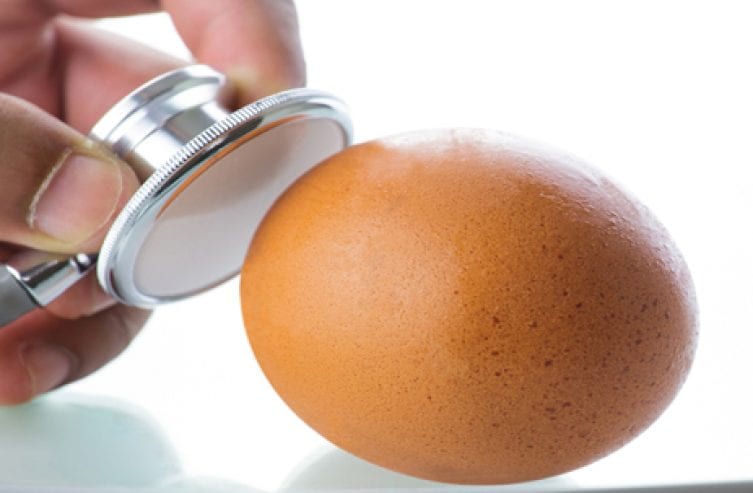You discover a lonely egg in your refrigerator. But how old is it? Can you still eat that? Here are four easy tricks to check the freshness of eggs!

You’ve probably stood in front of your fridge at some point and asked yourself: “When did I buy those eggs? I wonder if they’re still good?” Perhaps you cracked them open and gave them a sniff to check them, but there are other ways to test how fresh your eggs are. Here are a few of them:
1. The Water Test
Place your egg in a tall glass of cold water. If it stays at the bottom, it’s fresh. If it lifts and bobs at a bit of an angle, it’ll be older but fine to use. Does it float to the surface? Then it’s pretty old and is probably not safe to use. Get rid of it!
Eggs rise to the surface in this way because the moisture from inside the egg evaporates through the shell over time and is replaced by air. The more air there is in the egg, the better it floats – and of course the older it is.
2. The Cracking Test
Crack open your egg and pay attention to what the yolk and the white do. If the egg yolk bulges and the white is viscous and gathered tightly round the yolk, the egg is still fresh. If the yolk is flat and the egg white runny, the egg is old. The protein chains (various substances linked together) in the egg white break up over time. In an old egg, the yolk and white no longer cling tightly together and so run more.
3. The Sloshing Test
If you shake the egg and there’s no sloshing noise from inside, it’s fresh and can be eaten. If the egg makes a sloshing noise when you shake it, air has gotten into it and expanded the natural air bubble. Don’t eat it.
4. Pay attention to the use by date.
The packaging specifies a use by date. The supplier guarantees that the eggs will be usable at least until this date, provided they are stored properly. It’s usually safe to eat eggs for some time beyond the use by date, if they’re well cooked. Always confirm with one of the other freshness checks!
Storage
Things you should keep in mind when storing eggs:
- Store eggs in a refrigerator. Salmonella hardly multiplies at temperatures below 43°F, whereas at room temperature its growth is explosive. Retrospective cooling will not reverse any damage!
- Once eggs have passed their use by date they should only be eaten if thoroughly cooked. Salmonella is destroyed at 158°F.
- If an egg’s shell cracks it should be used immediately and only in well cooked dishes.
Where should I store eggs in my refrigerator?
- Eggs can be stored in the main refrigerator compartment for 15 days, or in a Liebherr BioFresh compartment for as long as 45 days.
Food Facts
Hygiene plays an important role when handling eggs and, with regard to salmonella in particular, you need to pay attention to the following:
- Buy your eggs as fresh as possible. Use them as close to the purchase date as possible.
- For recipes that require raw eggs, only use the very freshest eggs.
- Boil your breakfast eggs for at least 5 minutes.
- If an egg’s shell cracks it should be used immediately and only in well cooked dishes